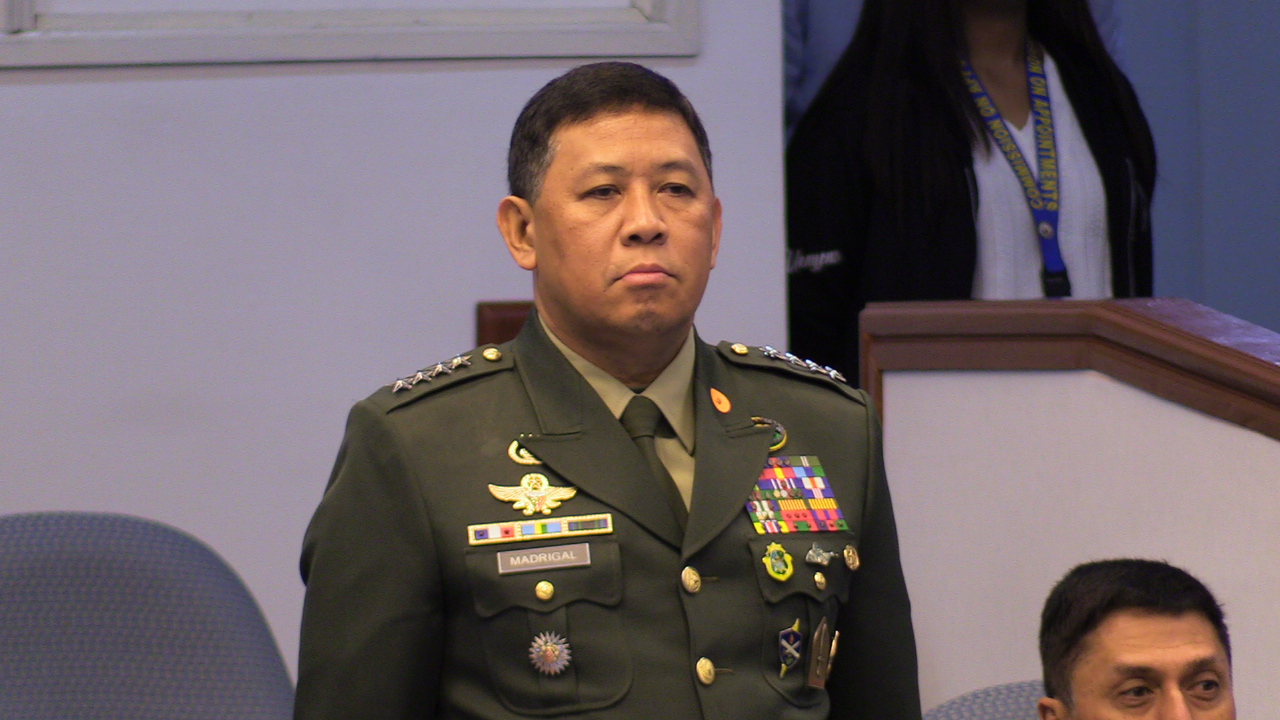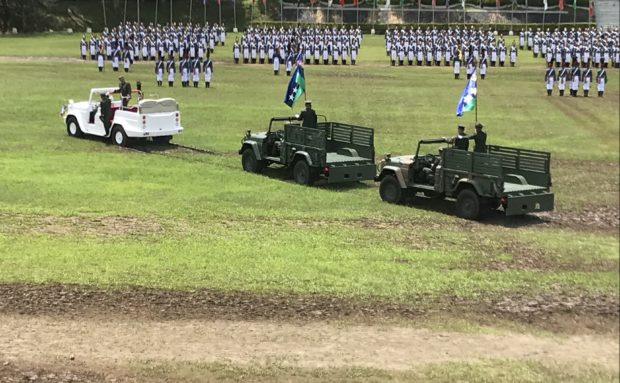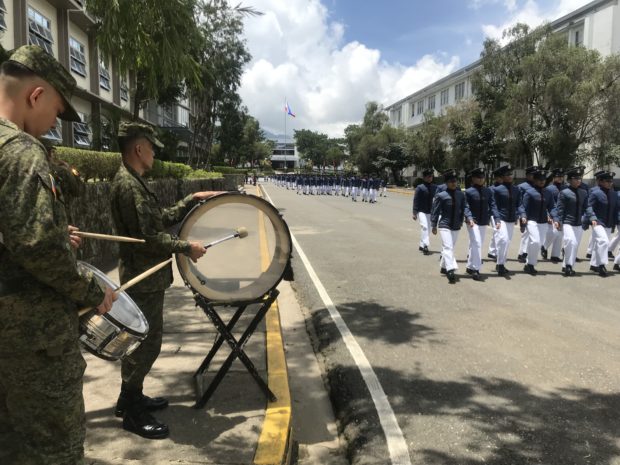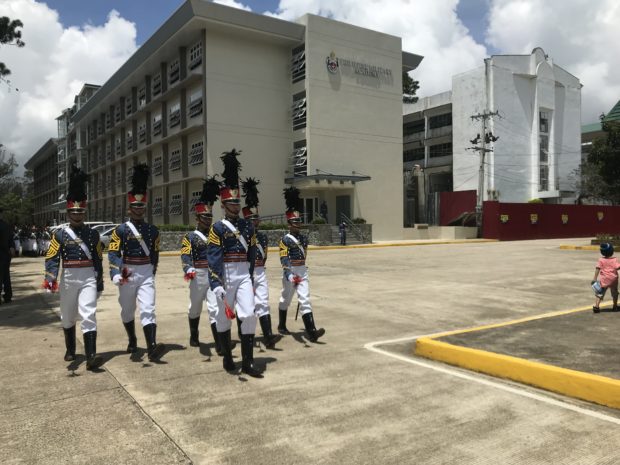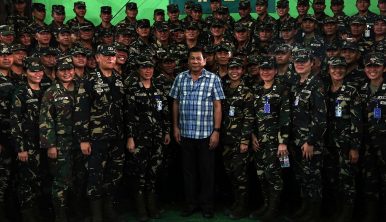From the Philippine News Agency (Sep 14, 2019):
Marawi celebrates Month of Peace as rehab efforts gain momentum
 RIDE FOR PEACE. Various participants in Marawi and other neighboring areas participated in the "Bike for Peace" held in Lanao del Suron on Sept. 10, 2019. The event was held in in celebration of the National Peace Consciousness Month 2019. (Photo courtesy of OPAPP)
RIDE FOR PEACE. Various participants in Marawi and other neighboring areas participated in the "Bike for Peace" held in Lanao del Suron on Sept. 10, 2019. The event was held in in celebration of the National Peace Consciousness Month 2019. (Photo courtesy of OPAPP)MARAWI CITY -- Around 170 high-end scooters lined the grounds of the provincial capitol here, their powerful engines revving up as riders eagerly waited for the get-go.
But what spectators were witnessing was no ordinary biking event. Dubbed “Ride for Peace,” it was the first of its kind to be held in Marawi and participated in by several riding clubs based in the city and other neighboring areas in the province.
The event was spearheaded by the Office of the Presidential Adviser on the Peace Process (OPAPP) in partnership with the Provincial Government of Lanao del Sur, Armed Forces of the Philippines (AFP), Task Force Bangon Marawi (TFBM), Bishops Ulama Conference and other local peace partners.
The ride kicked off at the Provincial Capitol, passed by the Lanao Lake, and ended in the municipality of Butig, Lanao del Sur on Sept. 10, 2019. It is among the series of activities being carried out by OPAPP in celebration of this years’ National Peace Consciousness Month.
Rising up“Itong idinaraos nating Peace Consciousness Month, kailangan din nating ma-feel, kailangan din nating gawin itong sinasabi nating peace. (As we celebrate Peace Consciousness Month, we need to feel, we need to put into action what we call peace),” Lanao del Sur Governor Mamintal Adiong Jr. said in his opening remarks.
“Kaya tayong mga Muslim, tayong mga Maranao, tayong mga Bangsamoro, kailangan lang natin magkaroon ng disiplina sa ating sarili. Ito yung pinakamasakit na experience natin. Pero kailangan nating bumangon.(We Muslims, Maranaos, Bangsamoro, we need to discipline ourselves. The siege was one of our most painful experiences. But we need to rise up),” Adiong said, recalling his people’s struggles during the 2017 siege.
Convergence of effortsFor TFBM Deputy Manager Antonio Sugarol, the theme of this year’s Peace Consciousness Month “Tapang at Malasakit Para sa Kapayapaan” calls for a “participative, collective and inclusive approach [for] our shared aspiration for a just, comprehensive and enduring peace.”
“The task of our national government, [as] represented by Task Force Bangon Marawi [is] to work together [with other peace stakeholders] to bring Marawi, including Butig and Piagapo, to recovery,” Sugarol said.
He admitted that achieving long-lasting peace in Marawi and throughout the province of Lanao del Sur could seem like a daunting task for everyone involved in the rehabilitation efforts, saying, “There are times we are faced with hardships and challenges.”
“However, I believe that if we just continue to work together as one, with [a] common interest and agenda, [Marawi’s recovery] will not be impossible,” Sugarol said, as he highlighted the initiatives being implemented by his office to help the city’s residents recover from the siege.
“For this year, the Bangon Marawi Comprehensive Recovery and Rehabilitation Program outlines the programs, projects and activities necessary to address the needs of the affected families in Marawi City, including Butig and Piagapo,” he said.
A timely celebrationAccording to Marawi Mayor Majul Gandamra, the Peace Month celebration is both timely and relevant because it will help promote the culture of peace in the city, and encourage everyone in the community to be involved in the rehabilitation process.
“Itong activity na ito ay isa sa mga paraan nang sa gayon maipagpatuloy natin ang pagsulong ng kapayapaan sa Lanao del Sur (This activity will be a way for us to continue to push for peace in Lanao del Sur.),” Gandamra said.
The mayor also appealed to his constituents, asking them to be patient and fully support the city government in implementing laws and regulations that are meant to ensure the safety and security of residents.
“’Yun ang utos ninyo sa akin, na magkaroon ng mapayapa at maayos na siyudad dito sa Marawi City. Kailangan po namin ang inyong suporta (That is what you want me to do, that Marawi will be peaceful and orderly. We need your support.),” Gandamra said.
Conducive business climateFor his part, Bangon Marawi Chamber of Commerce and Industry Vice President Saga Charlie Pagariongan emphasized that genuine peace will be the key in creating a conducive business climate in the city.
“Prosperity is meaningless if our people cannot live in peace and harmony. Regardless of culture, religion, ideology and affinity, we can always [have] peace with each other,” Pagariongan said, whose organization is at the forefront of efforts to revitalize the local business community.
“The chamber advocacy is to encourage our affected businessmen to return to Marawi because more than two years after the Marawi siege, businessmen, particularly [those coming from] the main battle area, are [still] uncertain of their future,” Pagariongan said.
“It pains us to see affected [Maranao] businessmen spread all over Luzon, Visayas and Mindanao just so they can earn a living,” the chamber official said, as he expressed confidence in the ability of provincial and city leaders to address the situation of the city’s business sector.
“I hope that the city government under [Mayor] Gandamra and the provincial local government will continue to provide support to businessmen here in Marawi,” Pagariongan said.
A victory for the BangsamoroAt the same event, OPAPP Program Manager James Alih Abdul noted that the celebration of Peace Month in Marawi is an indication that residents are starting to move on, and are working hand in hand to rebuild their community and their lives.
“Ito ang istorya natin. Gusto natin itong buuin. Simulan po natin itong istorya na ito (This is our story. We want to create it. Let us start [writing] this story.),” Abdul said, stressing the need to share the city’s inspiring story to people across the country and around the world.
Abdul noted the Bangsamoro people have a lot of reasons to celebrate. These include the establishment of the Bangsamoro Autonomous Region in Muslim Mindanao (BARMM) and the decommissioning of Moro Islamic Liberation Front (MILF) combatants.
“Binigyan na po tayo ng opportunity to govern. Malaki po na karangalan yan. Malaki pong victory ‘yan para sa ating mga Bangsamoro (We have been given the opportunity to govern. This is a big honor for us. This is a victory for the Bangsamoro people,” he said.
A show of solidarityFor Mohammad Lucman Said, one of the riders who joined in the Ride for Peace, his participation in the event is his way of expressing his solidarity with his fellow Maranaos, and contributing to peace-building efforts in his homeland.
He said that as an ordinary resident, there is nothing much he can do to help in the city’s rehabilitation. “Kahit ito lang yung part na masalihan namin, may maitutulong kami (Through our participation in this event, we will able to help.),” Said shared.
According to the 24-year-old professional photographer, he is now seeing the signs of recovery in the city. He said this can be gleaned from the business establishments and houses that are being built in the area, which once became a battleground between government troops and Islamist terrorists.
“Nakakabawi naman sila kasi may nakikita na akong may mga negosyo. [Nagtatayo] na ng bahay na paunti unti (They are now recovering because I see they already have businesses. They are also building houses,” he said.
https://www.pna.gov.ph/articles/1080456



















